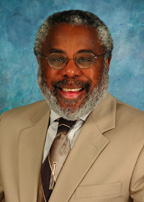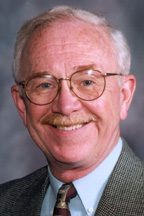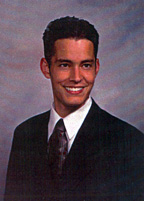UNMC and Fort Lewis College in Durango, Colo., have entered into an affiliation agreement that will enhance health science research and career opportunities for more Native American and Hispanic students.
UNMC Chancellor Harold M. Maurer, M.D., and Fort Lewis College President Kendall Blanchard, Ph.D., signed a formal statement of affiliation in February.
 |
John McClain |
“This is the first formal agreement that we have with a college representing a significant number of Native Americans,” said John McClain, Ph.D., UNMC associate vice chancellor for academic affairs.
“Dean Flechs, former director of the Office of Student Equity and Multicultural Affairs, began the Fort Lewis College initiative in 2001. We hope this affiliation will just be the first of several that focus on drawing more Native Americans to UNMC. We currently are exploring an affiliation with the University of North Dakota, another institution with a significant population of Native American students.”
Fort Lewis College
Fort Lewis College is a public liberal arts college — one of the 16 member institutions in the National Council of Public Liberal Arts Colleges. Named for a military fort near Pagosa Springs, Colo., in 1878, the post was moved near Hesperus, Colo., in the 1890s where it became an “Indian school.”
The school was created as part of a treaty agreement in which the region’s tribes ceded land to the federal government. In 1925, the school began to offer college-level courses. It became a junior college in 1948 and moved to its present location in Durango in 1956. It became a four-year liberal arts college in 1962 and graduated its first baccalaureate class in 1964.
Today, Fort Lewis College is one of only two schools in the United States that offers tuition waivers for all Native American students of federally recognized tribes who meet admission standards. With more than 4,000 students, Fort Lewis College has a Native American population of 700 students who represent 106 tribes from throughout the nation.
The affiliation agreement
The following are key components of the UNMC/FLC agreement:
- Selected Fort Lewis College students, in their sophomore year, will participate in a semester course that will introduce them to health careers and scientific investigation. A number of the lectures for this course will be taught via satellite by UNMC faculty members Jorge Rodriguez-Sierra, Ph.D., professor of genetics, cell biology and anatomy, and Jose Romero, M.D., associate professor of pediatrics-infectious disease.
- During the summer of their sophomore year, the students, guided by Fort Lewis College faculty, will conduct scientific investigations on the Fort Lewis College campus. Following this, three to five students will visit UNMC during the spring break of their junior year. During the summer of their junior year, the students will be brought to UNMC for a summer research internship opportunity.
- A faculty exchange program will be developed between UNMC and Fort Lewis College. Major considerations will be the scholarly interests of Fort Lewis College basic science faculty and their integration with ongoing or proposed scientific investigations at UNMC. Fort Lewis College junior faculty will be brought to UNMC for eight weeks during the summer. Hopefully, the faculty exchange program will coincide with the Summer Visiting Student Program.
Enhancing health science opportunities
 |
Stephen Roderick |
Fort Lewis College has highly active chapters of both the American Indian Science and Engineering Society and the Colorado Alliance for Minority Participation — a partnership between the state’s 12 community, junior, four-year colleges and universities, several corporations, government agencies and professional membership organizations, and four tribal nations – the Jicarilla Apache, the Navajo, the Southern Ute Indian, and the Ute Mountain Ute. Since 1990, Fort Lewis College also hosts the two-week Middle School Summer Science Camp, the only science camp geared toward underrepresented minority students from the fifth, six and seventh grades in the Four Corners area (crossroads for state borders of Colorado, Utah, New Mexico, Arizona).
“I’m not sure why more Native Americans are not in health careers,” said Phyllis Wallace, a 1999 graduate of UNMC’s College of Nursing and a member of the Choctaw Nation of Oklahoma. “Perhaps it’s because the American health system has been in conflict with traditional Native American beliefs about health and illness.
“I think the Fort Lewis College agreement will expose and inspire young Native Americans to want to pursue a health science career. I think many young Native Americans have not received the message that they are capable and can succeed in this kind of educational and professional career. The affiliation program can provide role models, perhaps even mentoring relationships, and a tangible goal.”
Summer research intern praises affiliation
Ryon Parker, is a 2002 graduate of Hastings College in Hastings, Neb., and the son a Lakota Sioux. In 2001, Parker was a summer research intern at UNMC. He appreciated the learning opportunities that will now be available to selected students from Fort Lewis College.
“Neither of my parents has a college education, but they both always motivated me to pursue an advanced degree,” Parker said. “As I grew up, I saw the lack of health professionals among the Lakota tribe and I wanted to contribute and make a difference.
“My parents never had the options available to many Native Americans today. I want to help improve the image of our people and break down the stereotypes and barriers that stop us from pursuing health science careers. My goal now is to be accepted to one of UNMC’s advanced health science programs and return to practice in the Valentine and on the reservation.”